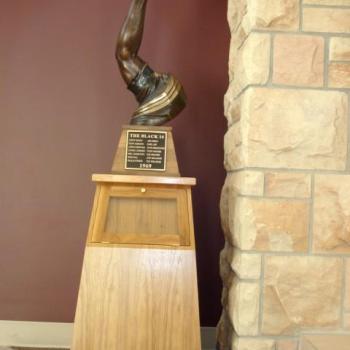These words, beginning my friend  Russell Stevenson’s one-sentence summary of one of my blog posts, should be spoken in fear and trepidation, and only at a Weight watcher’s meeting.
Russell Stevenson’s one-sentence summary of one of my blog posts, should be spoken in fear and trepidation, and only at a Weight watcher’s meeting.
I had a message from a good friend urging me to respond to the response to my first blog on priesthood restrictions, etc. I am not eager to enter the fray yet again, as it is generally unkind. But my statement was not: “[T]the proper way to address this is through personal conversations with leaders in power.” Reading that sentence, I too must say, “Seriously? Like we can just knock on Pres. Monson’s door and say, ‘Hey, could I have a moment of your time and some priesthood?'”
The problem with “explaining” all of the forces within and outside the LDS church’s reversal of its priesthood restriction from those of African lineage is that it can’t be done in a few paragraphs. Most of us who write blogs keep our posts to about 1,000 words. Russell Stevensen, who is doing good work in history, is right that Lamar Williams had an impact on the priesthood restriction because of faithful, unbaptized Saints he ministered to in Nigeria, but his efforts were stopped by President McKay, who was still wrestling with tradition and the parameters of a so-called doctrine. Soon thereafter, the Biafran war broke out and all missionary plans were tabled. More important than Williams, however, was Ambrose Chukwu, a Nigerian student who found John Stewart’s racist book Mormonism and the Negro. Chukwu’s letter to the editor was the precursor to Mormons being denied visas to the country because of the church’s discrimination. And before Chukwu were Monroe McKay and his father, James Gunn McKay, both missionaries in South Africa. Neither approved of the priesthood restriction, and Monroe spoke openly to President David O. McKay about the issue. It was Monroe who first was told that President McKay planned on going to South Africa, which he did in 1954. On that trip, Pres. McKay modified the restriction significantly, something he did in other countries as well, eliminating a “lineage trace” for any who might appear to have “one drop” of African blood. The end of the restriction was almost visible at that point.
I give that tiny bit of information to indicate the complexity of the history and the many players. There was not a monolithic effort to overturn the priesthood restriction, but there were significant events throughout the years, beginning in 1879, which culminated in the revelation of June 1, 1978. And I believe there was a revelation on that day, making it clear to many who had not understood the full implications of the scriptures that God was indeed no respecter of persons.
In Tristan Call’s piece about my piece, he says (after revealing that I had neglected to mention independence movements in various African nations or protests against BYU athletic teams and a few other things which could each be a dissertation), “Instead, Young’s piece only ever mentions three individuals (and a few of their friends) as having any impact on the change of the priesthood ban, making it seem like history is made by a few charismatic, well-behaved, people, single-handedly.”
First off, the two surviving members of the original Genesis presidency would have a good laugh over the patronizing phrase “well-behaved.” “Well-behaved” black men don’t make history. Secondly, I also mentioned something more important than Orr, Bridgeforth and Gray: Lester Bush’s paper on the issue published in Dialogue, and a few other things which would each require a dissertation to treat fully. However, it is vital to remember the effect of human interaction. Would the protests against Viet Nam have been so heartfelt and effective without the photo of the naked girl burning from Napalm? Would abolitionism have been so effective without Frederick Douglass telling his story and showing his whip-welted back? Martin Luther King called for a long overdue honoring of a promised check. But he came after W.E.B. Dubois, who finally gave up the fight for civil rights in America and moved to Ghana. On the eve of the March on Washington, Dubois died. Those preparing for the march were told simply, “The old man has died.” And with these giants in history go Charles Hamilton Houston, Thurgood Marshall, Medgar Evers, Rosa Parks–and many more, most of whom have been the subjects of full-length films.
There is far too much history here to include in one blog. I have written books, articles, essays, and have made three documentaries on the subject. If you really want to know the history, all three of the end-noted historical novels which Darius Gray and I wrote are newly revised and available at Amazon.com. The trilogy is called Standing on the Promises.
So, here we are. At this point in church history, the priesthood session will be available to anyone who chooses to watch it, though only men will be included in the live session at the Conference Center.
I remain with questions about what specific ordinations OW wants. Most non-Mormons do not understand our lay clergy. Usually, descriptions of the former priesthood restriction say, “Blacks were not allowed to be priests until 1978.” Those outside Mormonism will not understand how comprehensive the priesthood is, and what it means. Those within the church usually don’t understand it, or understand how it embraces male and female. I await some changes in regards to gender in the church, which I believe will come. They are not necessarily the changes OW is calling for. I believe the religious issues are far more complex than a simple call for ordination acknowledges, and that gender issues are more complex than either “camp” has articulated.
I have been thinking of this scripture: “Martha, Martha, thou art careful and troubled about many things. But one thing is needful, and she [Mary] hath chosen the better part.”
Careful–concerned with tiny details, like a woman preparing for her book group and noticing dust on the picture frames. No one should see dust in her home! What will they think? And where are the chocolate chips for the brownies? Did daughter #1 eat them AGAIN? And why isn’t daughter #1 helping anyway? Does she think I’m a slave?”
(I got a bit carried away. It felt so real for a moment. I have been that woman.)
Troubled: Filtering what we see through a lens focused on “other things.” (“Okay, here he goes with that same old prayer. Oh my heck. He actually used an accent on ‘Father’. ‘Fathah.’ That pretentious clod. I hate it when he prays. Oh here we go. ‘Bless us to love each other more fully.’ Right. Translation: He wants me to iron his shirts.”)
Most of us, men and women, have found ourselves full of cares and troubled. I remember a former Mormon expressing how “troubled” he was by the fact that Darius Gray and I were telling the stories of black pioneers. Surely we would sugar coat the tales! Well, we didn’t. If we had, maybe our books would have sold better.
Those who know me well (and they are few) know that I have been overwhelmed by cares and troubles, and desperate for peace. I am learning new dimensions of peace as I seek to ground myself deeper in the gospel I cherish, and as I surround myself with peaceable things and thoughts. I still struggle, but when I see where I have been and where I am now, I realize that I have climbed some serious mountains. I had no idea how steep they would be when I took my first steps up. And I know I did not climb alone.
The better part: Christ. Christ-centeredness. Learning how we can image Christ AND his female disciples who knew Him and testified of Him. Christ’s words, and the words of those who knew him.
“For God hath not given us the spirit of fear but of power and of love and of a sound mind.”
“Blessed are the peacemakers, for they shall be called the children of God.”
“Peace I leave with you. My peace give I unto you. Not as the world giveth give I unto you. Let not your hearts be troubled.”
“Her sins, which are many, are forgiven, for she loved much.”
“Why seek ye the living among the dead?”
“Did not our hearts burn within us?”
“A new commandment I give unto you: That ye love one another as I have loved you.”












